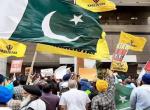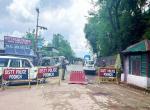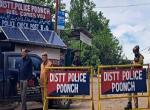One of the infirmities of our national security discourse is our skewed approach to the issues involved. We get disproportionally focused on the threat – its intensity, manifestations, damage caused etc. than the response required to address them. National security essentially pertains to what the state does, or should do, to effectively meet the anticipated threats - both at the strategic and tactical levels. Correct threat analysis and anticipation is an essential prerequisite but by itself provides no solution. It is useful only when followed by a determined and real time response. This happens when the state displays political will, mobilises its best human and material resources, brings about systemic improvements and builds capacities to neutralise the threats. That is precisely what the government has miserably failed to do.
The recent terrorist carnage in Mumbai is tragic not only for the innocent lives lost and people injured but, more importantly, for the failure of the government to build systems and capacities to meet a threat that has been bleeding the nation over and over again. When terrorist depredations happen ritualistic promises by the highest in the government that they will leave ‘no stone unturned to meet the threat’ and complimenting the people for returning to normal life is a cruel joke over hapless people. Following the 26/11 attacks the government failed to come out with any innovative ideas, security policies, legal and administrative reforms or strategic initiatives that could degrade capabilities of the terrorists, deter their mentors – both within and outside the country, deny soft targets to the terrorists through proactive and preventive actions or modernise the working of central and state security agencies. Worst, whatever little was assured, it failed to take any determined steps to execute them.
On May 20, 2009, Prime Minister Manmohan Singh said that he had a plan to “overhaul and modernise” internal security mechanisms. Claimed to be a 100-day internal security plan, the document, purportedly aimed at creating networked national security architecture to address a gamut of shortcomings that plagued the internal security structure of the country. A key component of the plan was to setup a National Counter Terrorism Centre (NCTC) that reportedly was to become operative within 100 days. Where is the Prime Minister’s plan on the ground to modernise internal security mechanisms? The proposal to form a National Counter Terrorism Centre, whose need and urgency the Home Minister has never been tired of emphasizing, has not even been placed before the Cabinet Committee on Security. Was the government just bluffing the country and saying the things that it never meant or is there some substance in the grapevine that differences in the cabinet sealed the fate of the internal security plan with the Prime Minister, remaining, as usual only a helpless spectator.
This is the time for the country to ponder how much we have done in real terms to set our house in order to manage our internal security. The government assurances and promises have lost their credibility. People want to see actions on the ground that deliver and results that are visible. The counter terrorist laws in our country are weaker even when compared to those where terrorism poses no or very little threat. POTA, though by itself a weak counter terrorist law as compared to other affected democracies in the world, was repealed – the first action on counter terrorism front that the UPA government took on assuming power in 2004! It not only weakened the state to deal with terrorism but demoralised the security agencies and sent a wrong signal to the terrorists and their mentors. Lack of a consistent and firm policy in dealing with Pakistan has projected the country in a very poor light. The government repeatedly asserted that no talks will be held with Pakistan till it punishes perpetrators of 26/11. Today, while by its own admission, the government feels that Pakistan has failed to deliver in respect of culprits of 26/11, it has not only resumed a full scale dialogue but is even prepared to have exclusive confabulation on Kashmir. The country has yet to get over its shame of Sharm-al-Sheikh.
There is another vital dimension of 13/7 attacks that deserves closer scrutiny. When a government fails to prevent, identify or neutralise the terrorists, it indicates inefficiency and systemic inadequacies. But when the perpetrators refuse to own responsibility, the causes are much more complex and, often, sinister. Terrorism is violence carried out in pursuit of some cause – political, religious or any other and the terrorists want the whole world to know about their existence, cause and the evil power. When terrorists strike but do not seek publicity they are usually working as somebody’s proxy and motives have more to do with the principals than the perpetrators.
Going by information coming from the government sources and open channels, there are strong indications that it was the handiwork of Indian Mujahedeen (IM) and the underworld working in collusion with some external forces. If so, it is an early warning of a serious internal security threat that the country appears to be heading for in the light of following reasons.
Firstly, after 26/11 SIMI, of which Indian Mujahedeen is only a deceptive front to mislead the security agencies, has been extremely active on organisational front during last two years. Government’s soft policies have led to the reluctance of security agencies to initiate action against anti-national elements unless they were involved in specific and serious cognisable offences. Repeal of POTA while on one hand emboldened SIMI on the other handicapped the law enforcing agencies from taking firm action against potential wrong doers. In a meeting following September 13, 2008 attacks in Delhi, a decision was taken by SIMI leadership that the organisation should take advantage of the contemporary favourable environment to reorganise and recruit cadres for Jihad. They also decided to refrain from sporadic acts of terror till they had strengthened themselves and acquired capabilities for spectacular actions. While they deepened relations with Pakistan through LeT and the underworld their role on terrorism was by and large confined to assist Pakistani terrorists. The first cause of worry is thus the new strengths gained by SIMI/IM, their good ground knowledge and local contacts and a wide ground spread. Inadequacy of laws, thin presence of an ill equipped police force on the ground and absence of political will to deal with the threat has compounded the problem manifold.
Secondly, SIMI/IM is only a motley group of youth recruited and motivated by Pakistan for the indigenisation of terror in India. It has negligible support of Indian Muslims and all Muslims outfits have denounced their ideology and activities. But for a vague slogan of waging Jihad for Islam, it has no specific political demands or cause. Its genesis lies in post 9/11 predicament of ISI when the latter compulsively realised that in the changed global environment it needed tactical change in its strategy of using terrorism as an instrument of state policy. For higher deniability, they targeted SIMI to be their front organisation to carry out their diktats. Using Dawood Ibrahim, CAM Bashir, a SIMI leader from Mumbai, was called to Dubai in 2001and the process of converting a radical Islamic youth organisation into a Pakistan controlled terrorist outfit started. However, SIMI’s terrorist performance fell far short of Pakistan’s high expectations and many were accused of making money without doing much. 26/11, however, forced Pakistan to resurrect it. 26/11 was rated by ISI as a successful covert operation but for the exposure of Pak nationals that made the overall cost non-affordable. It made ISI to re-double its efforts to re-organise SIMI hoping to increasingly use it for direct actions rather than merely for support actions. 13/7 is a manifestation of this effort. For ensuring deniability, SIMI is being accessed, financed and controlled through locations in Middle-East and the underworld is being primed to enhance its striking capabilities. The second cause of worry in thus SIMI/IM emerging as an empowered converging point of ISI, crime syndicates, radicalised local youth etc. to bleed India.
Thirdly, should Pakistan and the radical forces supported by it succeed in its nefarious design of indigenising terror; it potentially can generate communal conflicts with larger component of violence ingrained. This has been a long cherished objective of Pakistan that has been eluding it for decades. Our response should be imaginatively architected and calibrated to deny it to them.
The next problem emanates from the fact that our counter terrorist doctrines, structures and systems have over the years evolved around threats from foreign terrorists. Apprehending political fallout the government has even been on denial mode on local participation. Accepting the realities as they are and not as we wish them to be, the focus, particularly of intelligence agencies, will have to be expanded to cover activities of domestic players. This increases the role and responsibility of district and local level intelligence units of the state governments which are generally in a state of neglect. The government’s initiative of a National Intelligence Grid, though delayed, is a welcome step and needs to be pursued at a war footing.
In the emerging scenario the role of religious, social and civil society leaders of Muslim community assumes a critical importance. Both on their own and with support of the government, they should deepen their contacts with members of their community and deny any space to foreign inspired subversive elements. It is important that while taking firm actions against anti-national elements the innocents are fully protected and collateral damages avoided. The Muslim community leaders should be co-opted in this exercise by the law enforcing agencies who, when taken into confidence, in the past have been more than willing to cooperate.
Lastly, the role of political parties is going to be crucial. Politicising terror in all situations is bad but can be catastrophic if we have to face its indigenous variant. Temptations of resorting to vote bank politics would do immense harm to the country. The comment of Shri Digvijay Singh giving a communal slant to Mumbai carnage was, to say the least, a cruel joke on the nation.
Mumbai 13/7 may be an early warning of a more serious long term internal security threat looming on the horizon. We have many things in our favour and the nation is quite capable of meeting the threat provided the political parties start looking at the problem from a national and not electoral perspective. Lack of credibility of the government is a serious matter. It becomes all the more so when it relates to security matters as lack of credibility may lead to the erosion of legitimacy; potentially threatening the country’s stability. The country can ill afford that.
---------------------------------------
Published Date: 20th July, 2011









Post new comment